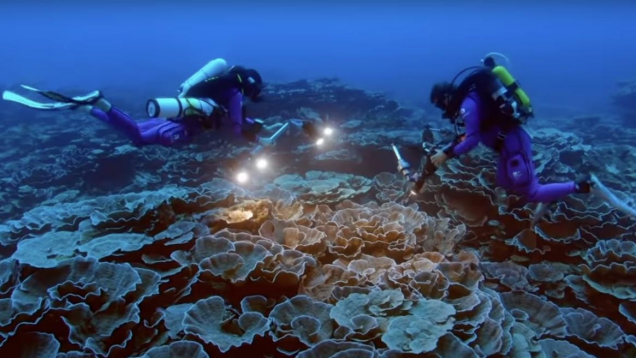
(Credit: BBC News/YouTube screenshot. A giant coral reef discovered by sea explorers off the coast of Tahiti in French Polynesia)
Scientists have discovered a new coral reef in a mysterious twilight zone of the ocean.
The reef, about two miles from Tahiti, flourishes at a depth of about 230 feet and seems impervious to the climate crisis, offering hope that more biodiversity can be found in the unexplored ocean.
"This time, the news on coral reefs is positive, which is very rare in recent times," Julian Barbiere, head of oceans policy at the United Nations Educational, Scientific and Cultural Organization (UNESCO), told CNN.
The newly discovered reefs lie in the transition zone of the ocean, where they still receive enough sunlight to support life. It was one of The largest reefs ever found at a depth of more than 30 meters, or about 98 feet, according to The Guardian. It was first spotted last November as part of a UNESCO-led mission to French Polynesia, where researchers spent 200 hours diving and exploring the coral, even watching it lay eggs.
Alexis Rosenfeld, a French underwater photographer who was part of the expedition, told the Guardian that it was "incredible" to see such a vast, huge, beautiful coral. "It's like a work of art."
The discovery comes at a dangerous time for coral reefs around the world, with a 2020 study finding that the number of living corals has fallen by half since 1950 due to overfishing, pollution and the climate crisis, CNN reported. Climate change is putting corals at risk, as rising ocean temperatures cause coral bleaching and increased carbon dioxide in the atmosphere causes ocean acidification. Scientists predict that 70 to 90 percent of the world's remaining corals could disappear in the next 20 years if conservation efforts are not strong enough.
However, the fact that this new reef looks so healthy gives us hope. Intact reefs take 25 to 30 years to thrive and become fully fledged, so new reefs have been around for at least a few decades. Scientists believe this could provide some clues to protecting other vulnerable coral reefs.
Laetitia Hedouin, a Marine biologist at the French National Centre of Scientific Research and CRIOBE Centre for Environmental Research, told CNN: "We think that deeper reefs may be better protected from global warming. So the discovery of this reef in such pristine conditions is good news and should inspire future conservation efforts."
It's part of a seafloor mapping Project called the Seabed2030 Project, highlighting the importance of understanding and protecting the ocean's depths, according to BBC news.
Julian Barbiere also notes that there may be many other unique ecosystems hiding in mysterious corners of the ocean. In particular, he said, efforts should be made to map them and try to protect them.
SOURCE:EcoWatch